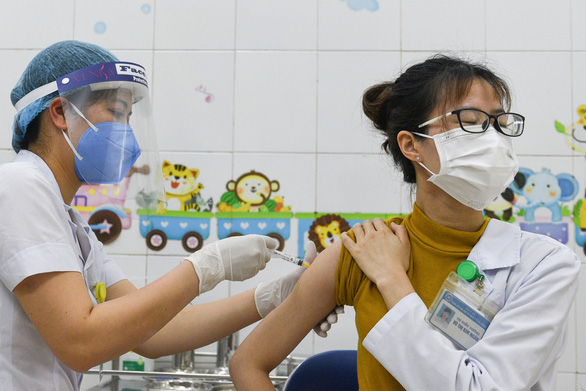While 26 percent of recipients of AstraZeneca’s COVID-19 vaccine in Vietnam have exhibited mild to severe local reactions, a health official reassured the reaction rates observed so far are “equivalent” to those in other types of inoculation.
COVID-19 vaccination in Vietnam began on Monday, and by Friday about 5,300 people in 12 provinces and cities had received their first jab of the AstraZeneca vaccine.
Among them, 26 percent exhibited local reactions, according to the country’s Preventive Medicine Department (PMD) vice-director Nguyen Minh Hang.
Only 12 recipients, or 0.7 percent, suffered severe reactions including narrow pulse pressure, swelling at the injection site, difficulty breathing, and hives, Hang said.
All of the 12 cases, including six recorded in Ho Chi Minh City, five in the northern coastal city of Hai Phong, and one in the Central Highlands province of Gia Lai, required hospital treatment for their reactions, the health official added.
The PMD, under the Ministry of Health, has issued formal requests that the health departments of these three localities verify the information and form councils to assess post-vaccination complications under their authority.
Conclusions on the causes of such severe reactions are to be reached and appropriate measures taken in accordance with regulations, the PMD asked.
According to Duong Thi Hong, head of the Office for the Expanded Program on Immunization – the unit put in charge of Vietnam’s COVID-19 vaccination campaign – the reaction rate observed in AstraZeneca vaccine recipients is “equivalent” to other vaccines already in circulation in the country.
Vietnam has yet to record increased blood viscosity as a postvaccinal side effect similar to cases recently reported in Europe, Hong said.
Life-threatening reactions such as high fever, seizures, and anaphylaxis are also not documented in Vietnam, she added.
Dang Duc Anh, director of the National Institute of Hygiene and Epidemiology, said Vietnam is putting in place its highest level of vaccination safety monitoring.
As such, any investigation or assessment of the cause of post-jab severe reactions is considered normal activity, Anh said.
COVID-19 inoculation in Vietnam will go ahead without interruption in the coming days, with Quang Ninh, Dien Bien, and Dong Thap being the next provinces to begin vaccine roll-outs, he added.
Vietnam will have over 5.6 million more AstraZeneca vaccine shots in March and April.
The country expects to obtain 150 million doses this year, with 60 million already secured from AstraZeneca and the COVAX scheme co-led by the World Health Organization.
The Southeast Asian country received its first COVID-19 vaccine shipment on February 24 – a batch of 117,600 doses of COVID-19 vaccine developed by AstraZeneca and the University of Oxford.
‘Vaccine passport’ on the horizon
As Vietnam is on track to have millions of people vaccinated against the coronavirus by May while vaccine roll-outs are also picking up speed in other countries, a 'vaccine passport' policy to shorten the mandatory quarantine period for those entering Vietnam already inoculated is on the table.
At a recent meeting of Vietnam’s National Steering Committee for COVID-19 Prevention and Control, the committee asked the Ministry of Health and Ministry of Information and Communications to coordinate a solution and technical preparations for such a scenario.
By April, an appropriate policy on foreign arrivals should have taken shape in line with the safety of each COVID-19 vaccine and the risk level of travelers from each country, facilitating Vietnam’s dual goal of maintaining growth while staying coronavirus-safe.
All arrivals to Vietnam currently have to undergo mandatory 14-day quarantine at a cost of at least VND120,000 (US$5.20) per day.
Second Vietnamese vaccine enters human trial
Vietnam’s National Institute of Hygiene and Epidemiology and Hanoi Medical University have announced they will begin human testing of Covivax, a COVID-19 jab developed by the Nha Trang Institute of Vaccines and Medical Biologicals, starting Monday.
This is the second Vietnam-made coronavirus vaccine to enter human trials after Nano Covax, developed by Ho Chi Minh City-based Nanogen, was first tested on 60 volunteers last December.
One-hundred and 20 volunteers aged 18-59 will take part in the Covivax trial, with an additional 300 set to participate on a later date.
The Covivax vaccine was previously deemed remarkably effective during animal testing evaluations conducted in Vietnam, the U.S., and India.
Like us on Facebook or follow us on Twitter to get the latest news about Vietnam!





















































